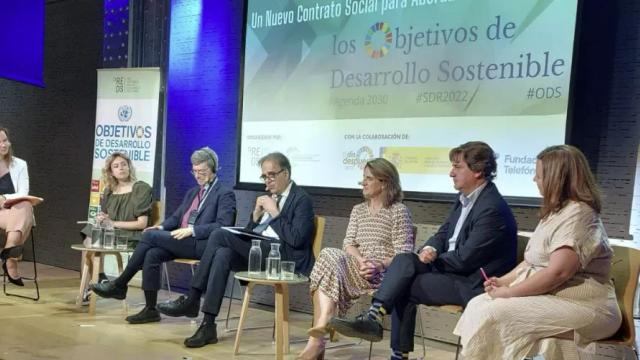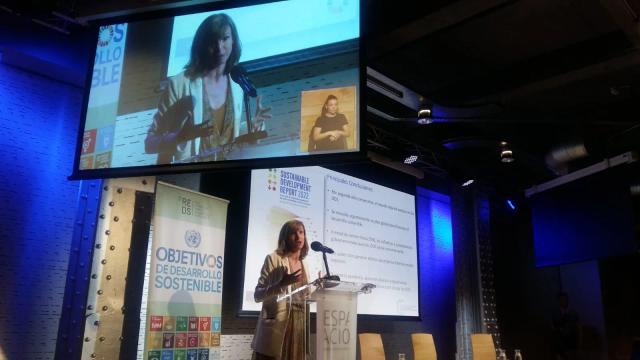SDSN Spain Presented the SDR in Madrid and Organized the Event "A New Social Contract to Address the SDGs"
In June 2022, the Spanish network of SDSN organized a high-level event to present the results of SDSN’s Sustainable Development Report 2022, with the participation of the Third Vice President, Teresa Ribera, and Jeffrey Sachs, president of SDSN.
On June 13, SDSN Spain presented SDSN’s 2022 Sustainable Development Report (SDR) in Madrid, followed by the high-level dialogue "A New Social Contract to Address the SDGs".
The conversation brought together a wide range of representatives from social, academic, institutional, and economic sectors, and was attended by various high-rank political representatives, including the Third Vice President and Minister for Ecological Transition, Teresa Ribera, the Minister of Universities, Joan Subirats, and the Secretary of State for the 2030 Agenda, Enrique Santiago.
María Cortés Puch, Vice President of SDSN, reviewed the main conclusions of this year’s SDR. She highlighted Spain's performance, which showed moderate progress in the midst of health, climate, biodiversity, geopolitical, and military crises. These crises are shown to have had a big impact on sustainable development globally. "The countries most vulnerable to the climate crisis are also the ones that find it most difficult to mobilize resources to address the direct and secondary impacts of these crises... let alone to raise the necessary funds to implement the 2030 Agenda," said Maria Cortés Puch in her speech. She therefore appealed, as does the SDR, to the need for a global plan to finance sustainable development.
Multistakeholder discussions on the New Social Contract
The presentation of the report was followed by two panel discussions moderated by Leire Pajín, President of REDS (SDSN Spain).
The first conversation took place between Jeffrey Sachs, President of SDSN, and the third Vice President and Minister for Ecological Transition and the Demographic Challenge, Teresa Ribera. In response to the initial question on how to ensure that the 2030 Agenda and the SDGs remain at the highest level of government priorities in these times of interlocking crises, both agreed on the paramount importance of dialogue and cooperation between nations and between all relevant actors in each country.
"This Agenda needs cooperation among neighbors. No country can do this on its own. And it is important to negotiate with our neighbors, something that occurs in the parliamentary systems of Europe, many of them with multi-party coalition agreements, something very complicated in politics. In Europe there is a lot of negotiation and it's all about consensus," said Sachs.
Vice President Ribera added two other key elements not to lose sight of on the path of transformation: knowing where we want to go, that is, sharing a horizon, and prioritizing the social agenda to ensure that the transformation benefits everyone and does not leave behind groups that may be negatively affected by the changes. In this sense, Ribera referred to the work developed in the design and implementation of the Recovery and Resilience Plan to highlight the importance of prioritizing the most vulnerable groups - those who suffer the most from the consequences of the crisis and who have the hardest time recovering - especially the rural world.
Along with the call for dialogue at all levels, Sachs underscored the importance of developing a strong plan for financing sustainable development in achieving the 2030 Agenda. "If we want to make this global agenda a reality we need a strategy for poor countries," he stressed. This is necessary financing because these countries, on their own, are not going to be able to address the transformations.
In the course of the conversation, the Vice President Ribera referred on several occasions to the importance of having the support of the public when addressing a systemic transformation such as that implied by sustainable development, and wondered whether "society is prepared to digest this transformation, and whether we have the professional skills, reflection, and public debate". In this sense, Ribera affirmed that "it is a collective responsibility, particularly of the institutions, to generate these spaces".
It is important to create experiences of participation and dialogue with society such as the Citizens' Climate Assembly , coordinated by REDS, among others. Within this initiative 100 people from all over Spain, randomly selected, have met on different weekends throughout 8 months to debate and put forward proposals on how to achieve a safer and fairer Spain in the face of climate change. Ribera referred to the Assembly as "an extraordinary initiative that has yet to unfold its fruits" and that "shows how a representation of that 'small country', in an assembly of these characteristics, reflects what the country as a whole would be like if it had the opportunity to dedicate time and effort to finding the right inputs to generate that reflection [on climate change]." The result of this experience has been 172 recommendations that the Assembly presented to the government in June.

